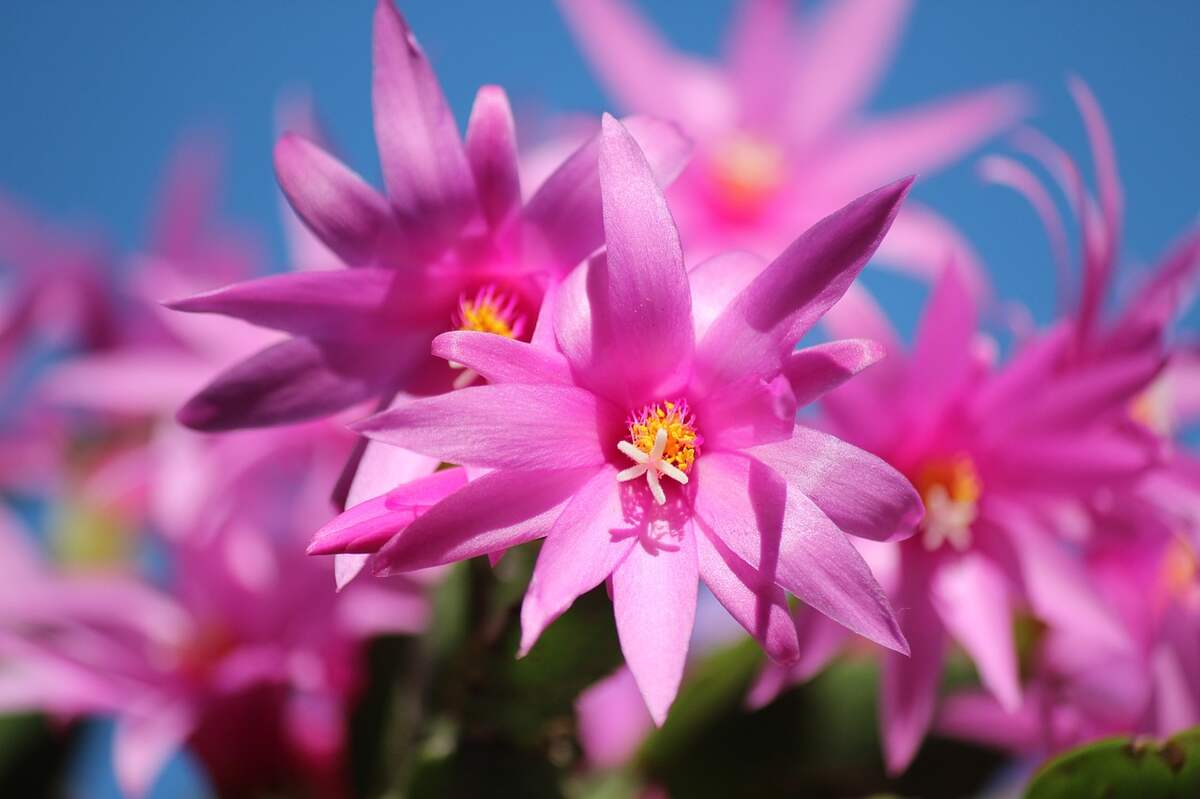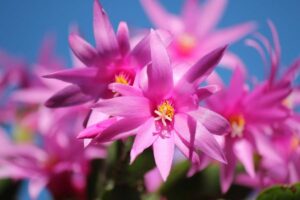Is Christmas Cactus Poisonous to Cats?
According to the American Society for the Prevention of Cruelty to Animals (ASPCA), Christmas cactus are not harmful to dogs, cats, or other animals. This indicates that it contains no chemicals that could react severely or endanger a cat’s life. But just because something is non-toxic doesn’t imply it’s totally safe. If consumed by a cat, the fibrous leaves and stems of the plant can lead to mild stomach discomfort.
It’s also important to keep an eye on your cat after any exposure to the plant because different cats may react differently based on their sensitivity or allergies.
What Happens if a Cat Eats Christmas Cactus?
The most likely result of your cat nibbling on the Christmas cactus is a slight upset stomach. Watch out for the following symptoms:
- Vomiting
- Diarrhea
- Drooling
- Reduced appetite
Usually mild, these symptoms go away in a day or two. To make sure your cat is hydrated and doesn’t exhibit any symptoms of damage, you should keep a tight eye on them. In a few cases, the symptoms may worsen if a cat eats a large quantity of the plant or if the soil contains dangerous additives like pesticides or fertilizers. If you observe severe lethargy, blood in the stool, or continuous vomiting, get veterinary help right away.
Why Does My Cat Love My Christmas Cactus?
Because cats are inherently curious, they frequently become fascinated with houseplants. Your cat can be drawn to your Christmas cactus for the following reasons:
Appearance : The colorful blossoms and peculiar dangling shape of the plant segments may catch your cat’s interest.
Texture : For cats who like to chew on plants, the cactus’s soft, chewy texture may be enjoyable.
Boredom : When bored or looking for excitement, cats frequently chew on plants.
Soil Scent : Some cats may find the scent of new potting soil inviting, which may pique their interest enough to dig or nibble on the plant.
You can provide alternatives such as interesting toys that divert your cat’s attention or cat-friendly plants (like wheatgrass or catnip) to keep them safe.
How Poisonous is Christmas Cactus?
Christmas cacti are very low-risk compared to truly dangerous plants such as philodendrons, poinsettias, and lilies. Although it doesn’t contain any recognized toxins, consuming high amounts of it could nonetheless cause some gastrointestinal discomfort.
The following indirect factors carry a higher risk:
Pesticides or fertilizers: Chemicals on plants or in the soil might be toxic if consumed.
Risk of Choking: Your cat may choke or get intestinal blockage if they ingest huge portions of the plant.
Even while houseplants are generally safe, it’s a good idea to keep an eye on your cat’s interactions with them to prevent any unwanted dangers.
Can I Have a Cactus if I Have a Cat?
Yes, even if you have cats in your house, you can still enjoy a Christmas cactus. To safeguard your plant and your kitty companion, you should take the following precautions:
Elevate the Plant: Put your cactus somewhere your cat can’t easily reach, like a hanging basket or high shelf.
Use Safe Soil: To avoid the dangers of fertilizers or pesticides, use potting soil free of chemicals.
Create Barriers: To keep your cat away from the cactus, use deterrent sprays, decorative stones, or plant covers.
To keep your cat entertained, make sure they have a lot of toys, scratching posts, or safe plants like cat grass.
Bonus Tips for Cat Owners Who Keep Houseplants
Here are some more suggestions for keeping your home safe and peaceful if you have a cat and enjoy houseplants:
Learn About Toxic Plants: Become familiar with a list of common plants that are harmful to cats, including philodendrons, aloe vera, and lilies.
Deterrents for cats: To deter your cat from nibbling on your plants, place pet-safe sprays or citrus peels around the base of the plants. Citrus odors are generally disliked by cats.
Track Behavior: Keep an eye on your cat’s interactions with houseplants and intervene if you see them gnawing or digging excessively.
Frequent Playtime: To prevent boredom and divert your cat’s attention from your plants, spend quality time playing with them.


















